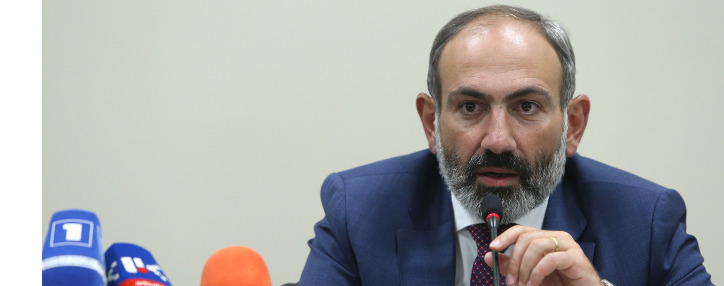Nikol Pashinyan presents his vision of Karabakh conflict settlement
09.05.2018,
19:17
The Artsakh (Nagorno-Karabakh) conflict cannot be resolved without the direct participation of its authorities in the peace process, Armenian Prime Minister Nikol Pashinyan told journalists on Wednesday.

STEPANAKERT, May 9. /ARKA/. The Artsakh (Nagorno-Karabakh) conflict cannot be resolved without the direct participation of its authorities in the peace process, Armenian Prime Minister Nikol Pashinyan told journalists on Wednesday.
Speaking to local and foreign reporters in Stepanakert, the capital of Nagorno-Karabakh today, Pashinyan said this conflict is impossible to resolve when one of the parties (Nagorno-Karabakh) is not present at the negotiating table.
"Only the Karabakh authorities have the right to speak on behalf of its people; likewise the authorities of Armenia can speak on behalf of its people,’ he said.
He stressed that Armenia does not refuse to settle the conflict within the format of the OSCE Minsk Group, but he recalled that Karabakh was recognized as a party to the conflict when that format was created.
Pashinyan stressed that the Armenian side always spoke only for a peaceful settlement of the conflict, unlike Azerbaijan, which not only continues using belligerent rhetoric, claiming that part of Armenia and even its capital Yerevan are a historical Azerbaijani land, but resorts also to the use of force.
"It is impossible to negotiate under this situation. Unless I see Azerbaijan's willingness to recognize the right of the population of Artsakh to self-determination, there will be no concessions from our side. Our main steps will be the enhancement of the security of Artsakh and Armenia, as well as pressing the international community to giving a clearer assessment of Azerbaijan’s war rhetoric and behavior,” Pashinyan said.
According to him, Armenia and Artsakh are not afraid of such rhetoric, but it does not contribute to the resolution of the conflict.
"Azerbaijan not only failed to protect the rights of the Armenian population of the Nagorno-Karabakh Autonomous Region, but also directly jeopardized their existence by resorting to hostilities. The question is not a matter of territories, but of the fact that the population of Artsakh was forced to begin defending their rights, security and existence," the prime minister said.
Pashinyan noted that today the negotiations have reached a deadlock, and the only way out is the return of Artsakh to the negotiating table and its international recognition.
According to him, the best mechanism to promote international recognition is to inform the world community about the essence of the Karabakh conflict.
"I consider it necessary for organizations that deal with human rights to start actively cooperate with the civil society of Artsakh, without which they cannot understand the essence of the Karabakh conflict," he said, noting that the latest manifestation of human rights violations were the atrocities committed by Azerbaijani troops during the four-day war in 2016 April.
Talking about the mechanisms for resolving the conflict, Pashinyan ruled out the possibility of deploying peacekeeping forces.
"Our army is able to ensure the safety of the population," he said. At the same time, the head of government stressed that the response to any attempt to violate the territorial integrity of the Republic of
Armenia will be harsh.
The Nagorno-Karabakh conflict erupted into armed clashes after the collapse of the Soviet Union in the early 1990s as the predominantly Armenian-populated enclave of Azerbaijan sought to secede from Azerbaijan and declared its independence backed by a successful referendum.
On May 12, 1994, the Bishkek cease-fire agreement put an end to the military operations. A truce was brokered by Russia in 1994, although no permanent peace agreement has been signed.
Since then, Nagorno-Karabakh and several adjacent regions have been under the control of Armenian forces of Karabakh. Nagorno-Karabakh is the longest-running post-Soviet era conflict and has continued to simmer despite the relative peace of the past two decades, with snipers causing tens of deaths a year.
On April 2, 2016, Azerbaijan launched military assaults along the entire perimeter of its contact line with Nagorno-Karabakh. Four days later a cease-fire was reached. -0---
Speaking to local and foreign reporters in Stepanakert, the capital of Nagorno-Karabakh today, Pashinyan said this conflict is impossible to resolve when one of the parties (Nagorno-Karabakh) is not present at the negotiating table.
"Only the Karabakh authorities have the right to speak on behalf of its people; likewise the authorities of Armenia can speak on behalf of its people,’ he said.
He stressed that Armenia does not refuse to settle the conflict within the format of the OSCE Minsk Group, but he recalled that Karabakh was recognized as a party to the conflict when that format was created.
Pashinyan stressed that the Armenian side always spoke only for a peaceful settlement of the conflict, unlike Azerbaijan, which not only continues using belligerent rhetoric, claiming that part of Armenia and even its capital Yerevan are a historical Azerbaijani land, but resorts also to the use of force.
"It is impossible to negotiate under this situation. Unless I see Azerbaijan's willingness to recognize the right of the population of Artsakh to self-determination, there will be no concessions from our side. Our main steps will be the enhancement of the security of Artsakh and Armenia, as well as pressing the international community to giving a clearer assessment of Azerbaijan’s war rhetoric and behavior,” Pashinyan said.
According to him, Armenia and Artsakh are not afraid of such rhetoric, but it does not contribute to the resolution of the conflict.
"Azerbaijan not only failed to protect the rights of the Armenian population of the Nagorno-Karabakh Autonomous Region, but also directly jeopardized their existence by resorting to hostilities. The question is not a matter of territories, but of the fact that the population of Artsakh was forced to begin defending their rights, security and existence," the prime minister said.
Pashinyan noted that today the negotiations have reached a deadlock, and the only way out is the return of Artsakh to the negotiating table and its international recognition.
According to him, the best mechanism to promote international recognition is to inform the world community about the essence of the Karabakh conflict.
"I consider it necessary for organizations that deal with human rights to start actively cooperate with the civil society of Artsakh, without which they cannot understand the essence of the Karabakh conflict," he said, noting that the latest manifestation of human rights violations were the atrocities committed by Azerbaijani troops during the four-day war in 2016 April.
Talking about the mechanisms for resolving the conflict, Pashinyan ruled out the possibility of deploying peacekeeping forces.
"Our army is able to ensure the safety of the population," he said. At the same time, the head of government stressed that the response to any attempt to violate the territorial integrity of the Republic of
Armenia will be harsh.
The Nagorno-Karabakh conflict erupted into armed clashes after the collapse of the Soviet Union in the early 1990s as the predominantly Armenian-populated enclave of Azerbaijan sought to secede from Azerbaijan and declared its independence backed by a successful referendum.
On May 12, 1994, the Bishkek cease-fire agreement put an end to the military operations. A truce was brokered by Russia in 1994, although no permanent peace agreement has been signed.
Since then, Nagorno-Karabakh and several adjacent regions have been under the control of Armenian forces of Karabakh. Nagorno-Karabakh is the longest-running post-Soviet era conflict and has continued to simmer despite the relative peace of the past two decades, with snipers causing tens of deaths a year.
On April 2, 2016, Azerbaijan launched military assaults along the entire perimeter of its contact line with Nagorno-Karabakh. Four days later a cease-fire was reached. -0---



